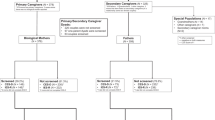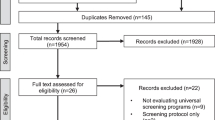Abstract
Objective
To evaluate the associations between parental resilience and psychological distress during the neonatal intensive care unit (NICU) hospitalization.
Study design
Observational cohort study of parents of preterm infants (n = 45) admitted to a NICU between December 2017–October 2019. Data on resilience and psychological distress were collected using validated scales. Regression analysis was used to evaluate associations.
Result
One-third of NICU parents screened positive for depression or anxiety. There were no identified sociodemographic factors or parental engagement activities associated with resilience. Parents with higher resilience had lower scores on depression and anxiety screens. However, resilience alone was not a predictor for a positive depression or anxiety screen (aOR 0.93, CI 0.86–1.00; aOR 0.95, CI 0.89–1.02, respectively).
Conclusion
Resilience may be associated with lower scores on depression and anxiety screens but is not an independent predictor for a positive screen during the early NICU hospitalization.
This is a preview of subscription content, access via your institution
Access options
Subscribe to this journal
Receive 12 print issues and online access
$259.00 per year
only $21.58 per issue
Buy this article
- Purchase on Springer Link
- Instant access to full article PDF
Prices may be subject to local taxes which are calculated during checkout

Similar content being viewed by others
Data availability
The datasets generated and analyzed during the current study are available from the corresponding author on reasonable request.
References
Greene MM, Rossman B, Patra K, Kratovil AL, Janes JE, Meier PP. Depression, anxiety, and perinatal-specific posttraumatic distress in mothers of very low birth weight infants in the neonatal intensive care unit. J Dev Behav Pediatr. 2015;36:362–70.
Lefkowitz DS, Baxt C, Evans JR. Prevalence and correlates of posttraumatic stress and postpartum depression in parents of infants in the Neonatal Intensive Care Unit (NICU). J Clin Psychol Med Settings. 2010;17:230–7.
Tahirkheli NN, Cherry AS, Tackett AP, McCaffree MA, Gillaspy SR. Postpartum depression on the neonatal intensive care unit: current perspectives. Int J Women’s Health. 2014;6:975–87.
Vigod SN, Villegas L, Dennis CL, Ross LE. Prevalence and risk factors for postpartum depression among women with preterm and low-birth-weight infants: a systematic review. BJOG. 2010;117:540–50.
Soghier LM, Kritikos KI, Carty CL, Glass P, Tuchman LK, Streisand R, et al. Parental depression symptoms at neonatal intensive care unit discharge and associated risk factors. J Pediatrics. 2020;227:163–9.
Dennis CL, Coghlan M, Vigod S. Can we identify mothers at-risk for postpartum anxiety in the immediate postpartum period using the State-Trait Anxiety Inventory? J Affect Disord. 2013;150:1217–20.
Rogers CE, Kidokoro H, Wallendorf M, Inder TE. Identifying mothers of very preterm infants at-risk for postpartum depression and anxiety before discharge. J Perinatol. 2013;33:171–6.
Mendelson T, Cluxton-Keller F, Vullo GC, Tandon SD, Noazin S. NICU-based interventions to reduce maternal depressive and anxiety symptoms: a meta-analysis. Pediatrics. 2017;139:e20161870.
Mughal MK, Giallo R, Arnold PD, Kehler H, Bright K, Benzies K, et al. Trajectories of maternal distress and risk of child developmental delays: Findings from the All Our Families (AOF) pregnancy cohort. J Affect Disord. 2019;248:1–12.
Herrman H, Stewart DE, Diaz-Granados N, Berger EL, Jackson B, Yuen T. What is resilience? Can J Psychiatry. 2011;56:258–65.
Connor KM, Davidson JR. Development of a new resilience scale: the Connor-Davidson Resilience Scale (CD-RISC). Depress Anxiety. 2003;18:76–82.
Jacelon CS. The trait and process of resilience. J Adv Nurs. 1997;25:123–9.
Long AC, Kross EK, Curtis JR. Family-centered outcomes during and after critical illness: current outcomes and opportunities for future investigation. Curr Opin Crit Care. 2016;22:613–20.
Rossman B, Greene MM, Kratovil AL, Meier PP. Resilience in mothers of very-low-birth-weight infants hospitalized in the NICU. J Obstet Gynecol Neonatal Nurs. 2017;46:434–45.
Pinelli J. Effects of family coping and resources on family adjustment and parental stress in the acute phase of the NICU experience. Neonatal Netw. 2000;19:27–37.
Lian BX, Amin Z, Aishworiya R. Juggling multiple roles amidst uncertainty: the Asian Father’s perspective of an infant in neonatal intensive care unit. Am J Perinatol. 2021;38:1420–7.
Ivashchuk A, Guillen U, Mackley A, Locke R, Sturtz W. Parental protective factors and stress in NICU mothers and fathers. J Perinatol. 2021;41:2000–8.
Ferrand A, Gorgos A, Ali N, Payot A. Resilience rather than medical factors: how parents predict quality of life of their sick newborn. J Pediatr. 2018;200:64–70.e5.
Dahan S, Bourque CJ, Reichherzer M, Prince J, Mantha G, Savaria M, et al. Community, hope, and resilience: parental perspectives on peer support in neonatology. J Pediatr. 2022;243:85–90.e2.
Harris PA, Taylor R, Thielke R, Payne J, Gonzalez N, Conde JG. Research electronic data capture (REDCap)–a metadata-driven methodology and workflow process for providing translational research informatics support. J Biomed Inform. 2009;42:377–81.
Programs AoMaCH. Life Course Indicator: Concentrated Disadvantage. Association of Maternal and Child Health Programs; 2013. http://www.amchp.org/programsandtopics/data-assessment/LifeCourseIndicatorDocuments/LC-06_ConcentratedDisad_Final-4-24-2014.pdf.
Messer LC, Laraia BA, Kaufman JS, Eyster J, Holzman C, Culhane J, et al. The development of a standardized neighborhood deprivation index. J Urban Health. 2006;83:1041–62.
Garg B, Sharma D, Farahbakhsh N. Assessment of sickness severity of illness in neonates: review of various neonatal illness scoring systems. J Matern Fetal Neonatal Med. 2018;31:1373–80.
Cox JL, Holden JM, Sagovsky R. Detection of postnatal depression. Development of the 10-item Edinburgh Postnatal Depression Scale. Br J Psychiatry. 1987;150:782–6.
Spielberger C, Gorsuch R, Lushene R, Vagg PR, Jacobs G. Manual for the State-Trait Anxiety Inventory (Form Y1 – Y2). Palo Alto, CA: Consulting Psychologists Press; 1983.
Britton JR. Maternal anxiety: course and antecedents during the early postpartum period. Depress Anxiety. 2008;25:793–800.
Miles MS, Funk SG, Carlson J. Parental Stressor Scale: neonatal intensive care unit. Nurs Res. 1993;42:148–52.
Zimet GD, Dahlem NW, Zimet SG, Farley GK. The Multidimensional Scale of Perceived Social Support. J Personal Assess. 1988;52:30–41.
Guintivano J, Manuck T, Meltzer-Brody S. Predictors of postpartum depression: a comprehensive review of the last decade of evidence. Clin Obstet Gynecol. 2018;61:591–603.
Pearlstein T, Howard M, Salisbury A, Zlotnick C. Postpartum depression. Am J Obstet Gynecol. 2009;200:357–64.
Silverman ME, Reichenberg A, Savitz DA, Cnattingius S, Lichtenstein P, Hultman CM, et al. The risk factors for postpartum depression: a population-based study. Depress Anxiety. 2017;34:178–87.
Garfield CF, Lee YS, Warner-Shifflett L, Christie R, Jackson KL, Miller E. Maternal and paternal depression symptoms during NICU stay and transition home. Pediatrics. 2021;148:e2020042747.
Caporali C, Pisoni C, Gasparini L, Ballante E, Zecca M, Orcesi S, et al. A global perspective on parental stress in the neonatal intensive care unit: a meta-analytic study. J Perinatol. 2020;40:1739–52.
Hames JL, Gasteiger C, McKenzie MR, Rowley S, Serlachius AS, Juth V, et al. Predictors of parental stress from admission to discharge in the neonatal special care unit. Child Care Health Dev. 2021;47:243–51.
Haley WE, Roth DL, Coleton MI, Ford GR, West CA, Collins RP, et al. Appraisal, coping, and social support as mediators of well-being in black and white family caregivers of patients with Alzheimer’s disease. J Consult Clin Psychol. 1996;64:121–9.
Ong HL, Vaingankar JA, Abdin E, Sambasivam R, Fauziana R, Tan ME, et al. Resilience and burden in caregivers of older adults: moderating and mediating effects of perceived social support. BMC Psychiatry. 2018;18:27.
Wilks SE, Croom B. Perceived stress and resilience in Alzheimer’s disease caregivers: testing moderation and mediation models of social support. Aging Ment Health. 2008;12:357–65.
Funding
This publication was supported by Award Numbers UL1TR001876 and KL2TR001877 from the NIH National Center for Advancing Translational Sciences. Its contents are solely the responsibility of the authors and do not necessarily represent the official views of the National Center for Advancing Translational Sciences of the National Institutes of Health.
Author information
Authors and Affiliations
Contributions
OO, YY, LW, KK, RS, CT, KF, LS: contributed to the conception, design, analysis, and interpretation of the data. OO, YY, KK: enrolled study participants. OO: Wrote first draft of manuscript. YY, LW, KK, RS, CT, KF, and LS: Critically reviewed and made edits to the manuscript. All authors approved the final version and agreed to be accountable for all aspects of the work.
Corresponding author
Ethics declarations
Competing interests
The authors declare no competing interests.
Additional information
Publisher’s note Springer Nature remains neutral with regard to jurisdictional claims in published maps and institutional affiliations.
Rights and permissions
Springer Nature or its licensor holds exclusive rights to this article under a publishing agreement with the author(s) or other rightsholder(s); author self-archiving of the accepted manuscript version of this article is solely governed by the terms of such publishing agreement and applicable law.
About this article
Cite this article
Okito, O., Yui, Y., Wallace, L. et al. Parental resilience and psychological distress in the neonatal intensive care unit. J Perinatol 42, 1504–1511 (2022). https://doi.org/10.1038/s41372-022-01478-3
Received:
Revised:
Accepted:
Published:
Issue Date:
DOI: https://doi.org/10.1038/s41372-022-01478-3



